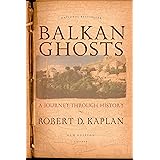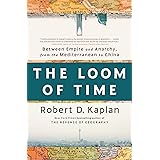
Download the free Kindle app and start reading Kindle books instantly on your smartphone, tablet or computer – no Kindle device required.
Read instantly on your browser with Kindle for Web.
Using your mobile phone camera, scan the code below and download the Kindle app.

Follow the author
OK
Surrender or Starve: Travels in Ethiopia, Sudan, Somalia, and Eritrea Paperback – Nov. 11 2003
Purchase options and add-ons
Reporting from Sudan, Ethiopia, Somalia, and Eritrea, Kaplan examines the factors behind the famine that ravaged the region in the 1980s, exploring the ethnic, religious, and class conflicts that are crucial for understanding the region today. He offers a new foreword and afterword that show how the nations have developed since the famine, and why this region will only grow more important to the United States. Wielding his trademark ability to blend on-the-ground reporting and cogent analysis, Robert D. Kaplan introduces us to a fascinating part of the world, one that it would behoove all of us to know more about.
-
Print length240 pages
-
LanguageEnglish
-
PublisherVintage
-
Publication dateNov. 11 2003
-
Dimensions13.18 x 1.52 x 20.32 cm
-
ISBN-101400034523
-
ISBN-13978-1400034529
Frequently bought together

Customers who bought this item also bought
Product description
Review
“This vivid account . . . tells very convincingly a story which the author claims was almost entirely ignored by Western media, diplomats, and relief officials. Kaplan paints a horrific picture of often fatal cruelty.” —Foreign Affairs
“Robert Kaplan is a scholarly and adventurous journalist. . . . He draws attention to long-term trends that other writers have little noted.” —The New York Times
“Kaplan is a gritty travel reporter and commentator on foreign affairs known for providing no-nonsense political-historical overviews of the dicey places he visits.” —The Washington Post Book World
From the Back Cover
Reporting from Sudan, Ethiopia, Somalia, and Eritrea, Kaplan examines the factors behind the famine that ravaged the region in the 1980s, exploring the ethnic, religious, and class conflicts that are crucial for understanding the region today. He offers a new foreword and afterword that show how the nations have developed since the famine, and why this region will only grow more important to the United States. Wielding his trademark ability to blend on-the-ground reporting and cogent analysis, Robert D. Kaplan introduces us to a fascinating part of the world, one that it would behoove all of us to know more about.
About the Author
Product details
- Publisher : Vintage; Reprint,Subsequent edition (Nov. 11 2003)
- Language : English
- Paperback : 240 pages
- ISBN-10 : 1400034523
- ISBN-13 : 978-1400034529
- Item weight : 239 g
- Dimensions : 13.18 x 1.52 x 20.32 cm
- Best Sellers Rank: #716,277 in Books (See Top 100 in Books)
- #2 in Somalia Travel Guides
- #4 in Eritrea Travel Guides
- #8 in Sudan Travel Guides
- Customer Reviews:
About the author

Robert David Kaplan (born June 23, 1952 in New York City) is an American author of many books on politics primarily foreign affairs and travel, whose work over three decades has appeared in The Atlantic, The Washington Post, The New York Times, The New Republic, The National Interest, Foreign Affairs and The Wall Street Journal, among other newspapers and publications.
His more controversial essays about the nature of US power have spurred debate and criticism in academia, the media, and the highest levels of government. One of Kaplan's most influential articles include "The Coming Anarchy", published in The Atlantic Monthly in 1994. Critics of the article has compared it to Huntingon's Clash of Civilizations thesis, since Kaplan presents conflicts in the contemporary world as the struggle between primitivism and civilizations. Another frequent theme in Kaplan's work is the reemergence of cultural and historical tensions temporarily suspended during the Cold War.
From March 2008 to spring 2012, Kaplan was a Senior Fellow at the Center for a New American Security in Washington, which he rejoined in 2015. Between 2012 and 2014, he was chief geopolitical analyst at Stratfor, a private global forecasting firm. In 2009, Secretary of Defense Robert Gates appointed Kaplan to the Defense Policy Board, a federal advisory committee to the United States Department of Defense. In 2011, Foreign Policy magazine named Kaplan as one of the world's "top 100 global thinkers."
Bio from Wikipedia, the free encyclopedia. Photo by Rosalie Bolender [CC BY 2.0 (http://creativecommons.org/licenses/by/2.0)], via Wikimedia Commons.
Customer reviews
-
Top reviews
Top reviews from Canada
There was a problem filtering reviews right now. Please try again later.
Kaplan generally tends to hold to the storyline that the United States is generally good for the world, certainly better than the other actors on the international stage, so the reader should be forewarned of his bias (which is present in all of his books that I have read).
At times the book comes across as having been hastily composed and lacking a sharp eyed editor who should have caught the typos, omitted words, and incorrect grammar. Still an interesting read which might help one to think more clearly about the so called benefits of foreign aid among other issues.
What matters most in this book in Kaplan's use of realism when interpreting events in the Horn of Africa, as he has done in all his other books covering various hellholes around the developing world. While the famines in the mid-80s shocked the world, most Western people (and governments) thought that drought was the unavoidable culprit. However, Kaplan proves through ground-level experience that the famines were really the outcome of murderous political policies, as food (and the withholding of it) was used as a weapon by the ruling regimes to control dissident groups, while never-ending civil wars and power politics impeded distribution of aid money and supplies.
Beware that this book nearly collapses in Part 4 as Kaplan analyzes the actions of the US and USSR when the Horn became embroiled in Cold War politics. Kaplan behaves like a Monday morning quarterback in criticizing the actions of both sides, with a rather bigheaded display of second-guessing toward the actions of international leaders, that only demonstrates Kaplan's unfair advantage of 20/20 hindsight. Fortunately, this problem (which also infects several of Kaplan's other books) does not sink this mostly powerful study of how ground-level knowledge from such Third World hot spots, and a truly realistic outlook, are the only ways to understand what's truly going on behind attention-grabbing stories of war and famine. [~doomsdayer520~]
Top reviews from other countries
I must confess my ignorance about Ethiopia. I grew up with the commercials for starving children and famine relief and Live Aid, but I never actually knew much about it. I just figured it was another group of hungry people who were doomed by bad weather and bad geography. I never paid much attention to the issues of that part of the world, so I was shocked to learn just how much I had missed in my own lifetime in Ethiopia. Kaplan does a terrific job of explaining the background and bringing the issues to vivid life. This book is somewhat dated, but it still serves as a great description of what was happening in the region in the 1980s and 1990s and it helps shed light on the issues facing the region today.
Concerning mainly Ethiopia, and what would later become the separate country of Eritrea, we are given essentially a journey through history, as Kaplan recounts the long history of divisions in what was then Ethiopia, reaching back to Italian colonial intervention, up to the present, with the Soviet sponsored Dergue government.
What is revealed is quite a horrifying portrait, with hunger being used as a political tool by the Communist regime in Addis Ababa, and how conflict, political or ethnic, has taken the Horn of Africa into a nightmarish reality of Biblical scale.
Interesting insight is also contained with regard to Sudan, and the then conflict over Darfur. As someone who at first became familiar with Darfur in headlines starting from about 2003 onward, it was interesting to learn that this conflict is far from recent news, and was just as bad in the 1980s, however Western Media attention was elsewhere.
Despite being written in the 1980s, this book is still very much relevant, as it contains insight into the divisions, and factors exacerbating division, in this tumultuous region of the world.












